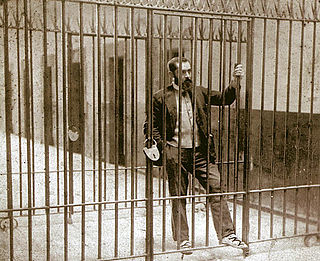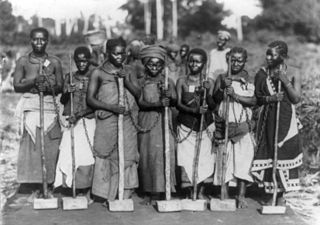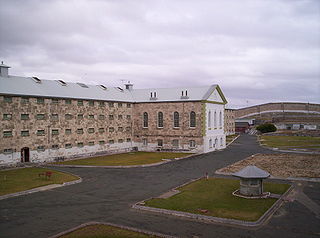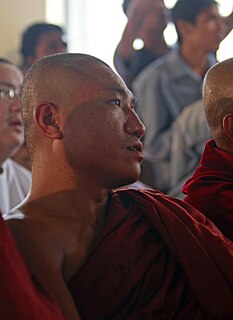
A political prisoner is someone imprisoned because they have opposed or criticized the government responsible for their imprisonment.
Parole is a temporary release of a prisoner who agrees to certain conditions before the completion of the maximum sentence period, originating from the French parole. The term became associated during the Middle Ages with the release of prisoners who gave their word.

Incarceration in the United States is one of the main forms of punishment and rehabilitation for the commission of felony and other offenses. The United States has the largest prison population in the world, and the highest per-capita incarceration rate. In 2016 in the US, there were 655 people incarcerated per 100,000 population. This is the US incarceration rate for adults or people tried as adults. In 2016, 2.2 million Americans have been incarcerated, which means for every 100,000 there are 655 that are currently inmates. This costs the United States government $80 billion dollars a year.

A debtors' prison is a prison for people who are unable to pay debt. Through the mid 19th century, debtors' prisons were a common way to deal with unpaid debt in places like Western Europe. Destitute persons who were unable to pay a court-ordered judgment would be incarcerated in these prisons until they had worked off their debt via labor or secured outside funds to pay the balance. The product of their labor went towards both the costs of their incarceration and their accrued debt. Increasing access and lenience throughout the history of bankruptcy law have made prison terms for unaggravated indigence illegal over most of the world.
Felony disenfranchisement is the exclusion from voting of people otherwise eligible to vote due to conviction of a criminal offense, usually restricted to the more serious class of crimes: felonies. Jurisdictions vary as to whether they make such disfranchisement permanent, or restore suffrage after a person has served a sentence, or completed parole or probation. Felony disenfranchisement is one among the collateral consequences of criminal conviction and the loss of rights due to conviction for criminal offense.
The jurats are lay people in Guernsey and Jersey who act as judges of fact rather than law, though they preside over land conveyances and liquor licensing. In Alderney, however, the jurats are judges of both fact and law in both civil and criminal matters.

Penal labour is a generic term for various kinds of unfree labour which prisoners are required to perform, typically manual labour. The work may be light or hard, depending on the context. Forms of sentence involving penal labour have included involuntary servitude, penal servitude and imprisonment with hard labour. The term may refer to several related scenarios: labour as a form of punishment, the prison system used as a means to secure labour, and labour as providing occupation for convicts. These scenarios can be applied to those imprisoned for political, religious, war, or other reasons as well as to criminal convicts.
Yodok concentration camp was a political prison camp in North Korea. The official name was Kwan-li-so No. 15. The camp was used to segregate those seen as enemies of the state, punish them for political misdemeanors and put them to hard labour. It was closed down in 2014.

The situation for human rights in Syria is considered egregiously poor among international observers. A state of emergency was in effect from 1963 until April 2011, giving security forces sweeping powers of arrest and detention.

A prison uniform is the unified outward appearance of detainees in a situation of imprisonment. It is typically adapted under constraint.
The Longford Prize is an annual award presented in the United Kingdom to an organisation or individual working in the field of social or penal reform. The award was established in 2002 in honour of Lord Longford, a lifelong penal reform campaigner, and has been sponsored by both The Independent and The Daily Telegraph. It is organized in association with the Prison Reform Trust and is presented at the annual Longford Lecture.

Detention is the process whereby a state or private citizen lawfully holds a person by removing his or her freedom or liberty at that time. This can be due to (pending) criminal charges preferred against the individual pursuant to a prosecution or to protect a person or property. Being detained does not always result in being taken to a particular area, either for interrogation or as punishment for a crime.

Prisoners Abroad is a UK-registered human rights and welfare charity which supports British citizens who are imprisoned overseas. It also works with ex-prisoners returning to the UK and family members and friends of those detained.

Ansar Burney is a leading Pakistani human and civil rights activist and former caretaker minister in Soomro cabinet in 2007-08. He graduated with Masters in Law from Karachi University. He is widely credited as being the first man to introduce the concept of human rights in Pakistan nearly 30 years ago.

The Prison Advice and Care Trust (pact) is an independent UK charity that provides practical services for prisoners and prisoners' families. First established as the Catholic Prisoners Aid Society in 1898, pact works at several prisons across England and Wales.
North Korea's political penal labour colonies, transliterated kwalliso or kwan-li-so, constitute one of three forms of political imprisonment in the country, the other two being what Hawk translated as "short-term detention/forced-labor centers" and "long-term prison labor camps", for misdemeanour and felony offenses respectively. In total, there are an estimated 80,000 to 120,000 political prisoners.

Punishment in Australia arises when an individual has been convicted of breaking the law through the Australian criminal justice system. Australia uses prisons, as well as community corrections. The death penalty has been abolished, and corporal punishment is no longer used. Before the colonisation of Australia by Europeans, Indigenous Australians had their own traditional punishments, some of which are still practised.

U Gambira is a former Buddhist monk, activist and a leader of the All-Burma Monks' Alliance, a group which helped lead the 2007 protests against Burma's military government. Following the protests, he went into hiding and published two editorials critical of the Burmese government in the Washington Post and The Guardian on 4 November 2007. He was arrested the same day.













